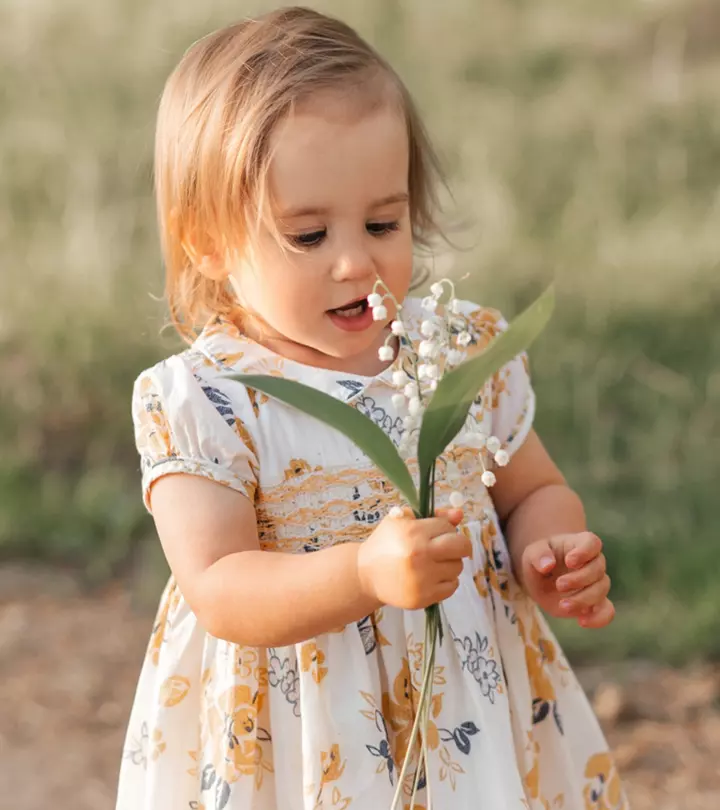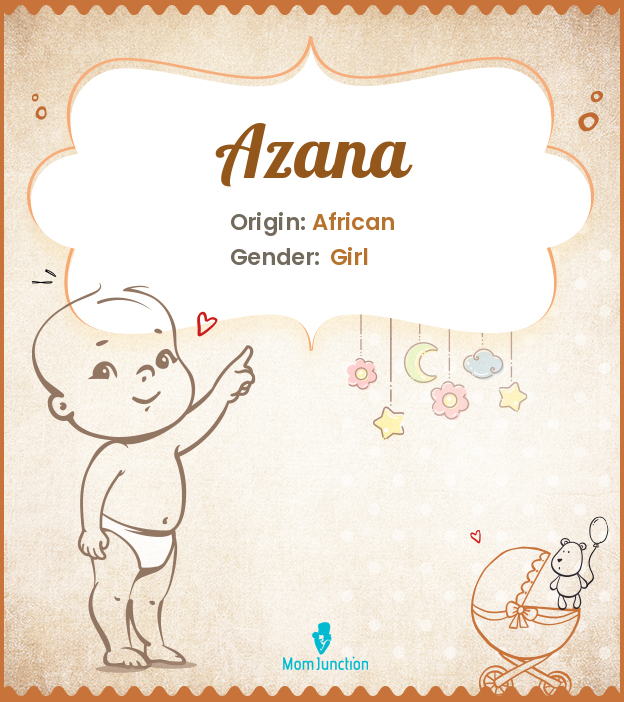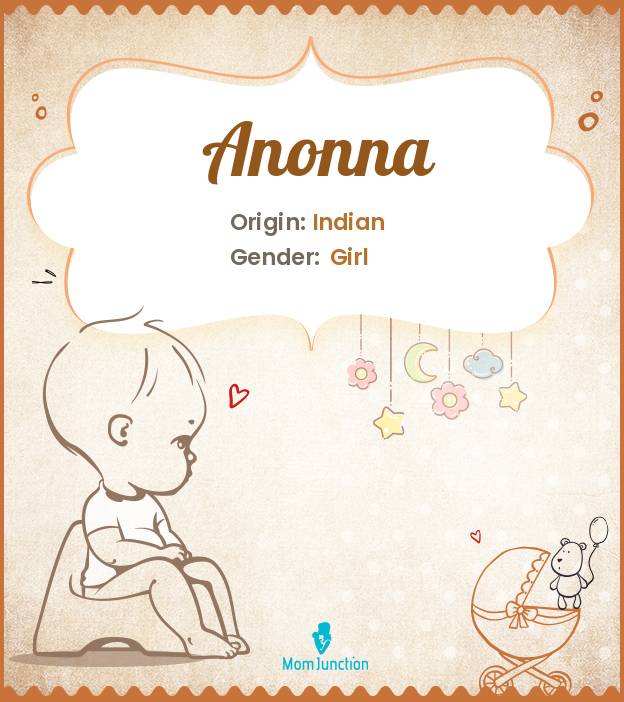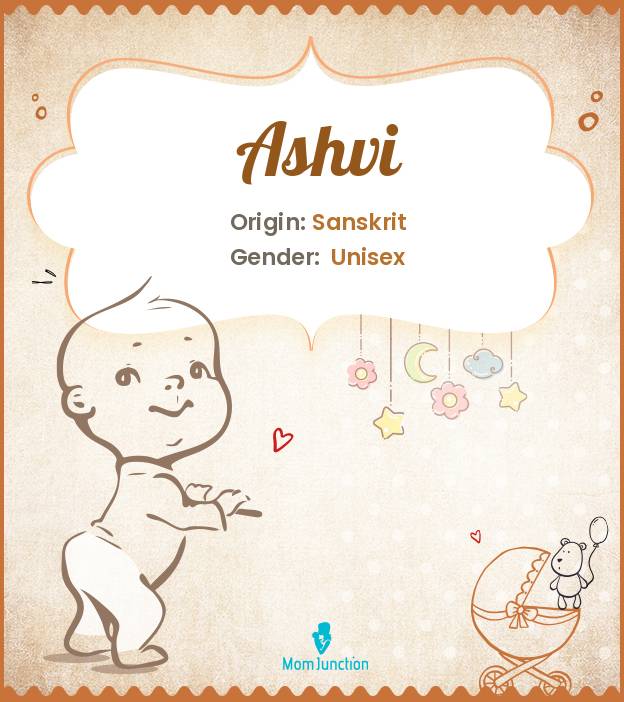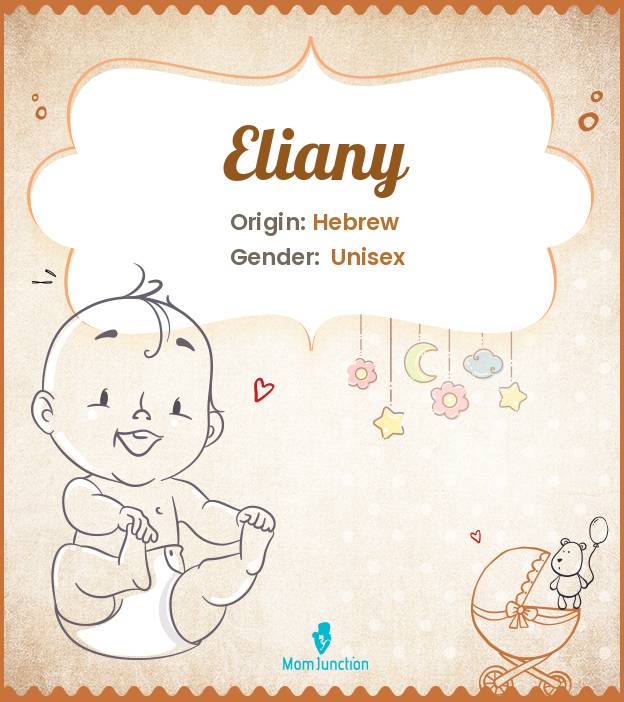419 Resilient Japanese Boy Names
Array of culturally rich names that encapsulate the essence of the land of the rising sun.
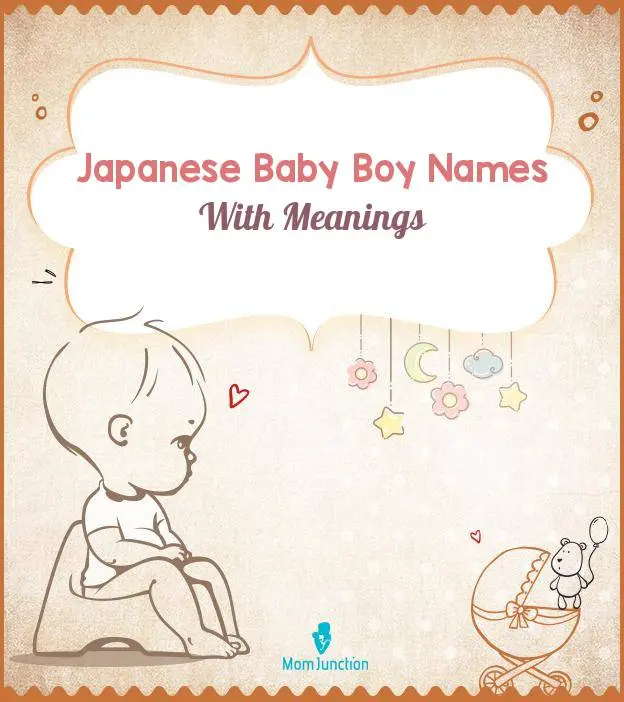
Illustration: MomJunction Design Team
Like most cultures, Japanese baby boy names are influenced by their history, culture, and traditions. These names often combine ancient customs, religious beliefs, and linguistic influences.
The Japanese have been influenced by Chinese culture, which spread particularly during the Tang dynasty (1). It is evident in their use of kanji characters, which were adopted from Chinese script (2). Even though Japanese names are written in kanji, they are still quite distinctive and can easily be differentiated from Chinese names. Many Japanese names for boys are derived from kanji, and the characters chosen often hold symbolic meanings related to nature, virtues, or desired attributes. Most first names in Japan have one, two, or three kanji. Four-syllable names are mostly given to the eldest sons in a family.
Religious beliefs also play a factor in the naming of boys in Japan. Shinto, Japan's indigenous religion (3), has a great influence on naming customs. Many baby boy names are associated with Shinto deities, historical characters, or natural and spiritual elements. Furthermore, Buddhism, which was introduced to Japan via Korea and China (4), also shows its influence in Japanese names. Buddhist names are frequently associated with enlightenment, virtue, or religious notions.
Names in Japanese culture also tend to reflect the parents' hopes for their children. Parents choose names that signify positive attributes or express their aspirations for the child's future success. Positive traits and goals are embodied by names such as Haruki, meaning spring and radiance, and Hiroshi, meaning generous and kind. Some Japanese first names, such as Mayumi, Kaneko, Masuko, and Arata, can also be used as surnames.
Western names have gained popularity in Japan but traditional Japanese names remain highly valued, showcasing Japan's unique naming tradition.
On This Page
Browse Baby Names By Gender
Browse Baby Names By Alphabet
| Name | Gender | Meaning | |
|---|---|---|---|
|
|
Victorious; Attractive; Summer color | ||
|
|
From Rome; Roman; Bright; Clear | ||
|
|
Thunder; Lightning; God spirit | ||
|
|
An enclosure for calves; Calf town; Fruit; Village; Mist | ||
|
|
Little seal; Masterless samurai; Anaconda | ||
|
|
Ray of light; Advice; Counselor; Wise protector; Little fire; Thunder | ||
|
|
Oarsman; Rower; Lord consoles in me; Heaven; Sky | ||
|
|
Second son; Strong; Healthy | ||
|
|
Victorious people; People's victory; Daylight | ||
|
|
Continuous improvement | ||
|
|
Saint; Holy person; Affection | ||
|
|
Continuous improvement | ||
|
|
Dragon; Noble; Prosperous | ||
|
|
Sea; Ocean; Soar; Fly | ||
|
|
Great peace; Friends or allies; Fort | ||
|
|
Ocean; Request garden | ||
|
|
Powerful; Fierce; Unstoppable | ||
|
|
The hidden one; Trustworthy; Secret; Stable; Faithful; Immortal; Come after | ||
|
|
Good health; Intelligent; Born of fire; Handsome | ||
|
|
Moonlight; Kickball | ||
|
|
Gold; Compassionate | ||
|
|
Lion; Of Zeus; The homeland; To construct; Strong; Respect | ||
|
|
In a cauldron or hollow; Ice; Curly-haired; Coral | ||
|
|
Who knows it all; Second of twins; Wise; Increasing wisteria; East of the river | ||
|
|
Famous ruler; Fortress; Kind; Sympathy; Flow | ||
|
|
Selected; Joseon | ||
|
|
Bright man; Luminous hero | ||
|
|
Shadow; Enclosed space | ||
|
|
Cooked rice | ||
|
|
Praiser; Poet; Light beam; One who praises; Sacred creature representing beauty, grace, and knowledge | ||
|
|
Twin; Wealth; Abundance; Capital; Beautiful | ||
|
|
Warrior; Gold; Metal; Money; Fanatic | ||
|
|
Created by God; God has created | ||
|
|
Candle; Advice; Army; Love; Oath | ||
|
|
High well | ||
|
|
Prosperous; Happiness; Fortune | ||
|
|
Cheerful; Comfortable; World; Boundary; Open; Ravine; Gorge; Man; Hero; Lively | ||
|
|
Powerful ruler; Mighty king; Land | ||
|
|
Bright clear weather; Spring child | ||
|
|
Sprout child; Bright child; Bud child | ||
|
|
Resolute; Lethal | ||
|
|
Trust; Lightning; Thunder; King | ||
|
|
Cool; Clear; Good; Thick; Great | ||
|
|
Half; To hide; Yahweh is gracious | ||
|
|
Second son; Next son; Next melodious | ||
|
|
One who was born to counsel; Sunshine; Protecting hands; Thunder | ||
|
|
Supplanter; Holder of the heel; May God protect; Universally | ||
|
|
Military man; Husband; Hero; Manly; Healthy | ||
|
|
A person who is strong and healthy; Happiness; Rising up | ||
|
|
Right; Correct; True; Good; Virtuous; Loyalty; Devotion | ||
|
|
Great; Exalted; Superior; Glory; Peaceful; Good; Very; Extreme; Many crystals | ||
|
|
Permanence; Excellence; Superiority; Gentleness; Soar; Fly | ||
|
|
Excellence; Esteem; Excellent; Timber trees | ||
|
|
Generous; Tolerant | ||
|
|
Bright; Sparkle; Broad; Widespread | ||
|
|
Pure | ||
|
|
My guardian; Blessing; Beautiful; Love; Good; Clean | ||
|
|
Awakened to emptiness | ||
|
|
High-valued second son | ||
|
|
Wise; Mountain opener | ||
|
|
A helper; Assistant; Shellfish; Concern oneself with | ||
|
|
Immortal being; Blessed with eternal life; Grace and gracious; Sky and to smile; Heaven and virtuous; Bitter | ||
|
|
Blessed; Blessing; Convenience | ||
|
|
Bastard dog; Mongrel | ||
|
|
Light; Sunny person; Distant; Remote; Clear weather | ||
|
|
Weasel | ||
|
|
Humble; Modest; Trust; Believe | ||
|
|
Ten thousand; Hemp; Wisdom; Pure; City; Man battle | ||
|
|
Adore; Bright; Sincere; The sound of the wind | ||
|
|
Soar; Prize | ||
|
|
Sudden; Sound of the wind; Thick; Big; Great | ||
|
|
Handsome; Respect | ||
|
|
Three; Character; Three o'clock; Praise | ||
|
|
Friend; Hope | ||
|
|
Aythe's son; Noble title | ||
|
|
Circle; Circular form | ||
|
|
Home ruler; Frenchman; Hopeful child; Rare child | ||
|
|
Ocean; Sea; Inferno | ||
|
|
The moon; Will helmet; Sensitivity; Bright; Established one | ||
|
|
Thunder; Lightning; Protector's counsel | ||
|
|
The calm and peaceful one | ||
|
|
Ten; Heap up; Pile | ||
|
|
New; Flat; Smooth; Morning; Dawn; Pale; Deep pool; Lake; Quiet; Tranquil; Resist; Withstand | ||
|
|
Planetary; Help; Save; Righteous friend | ||
|
|
Achieve | ||
|
|
Invented name | ||
|
|
Beloved or uncle; Great; Demand; Divine; Goddesslike | ||
|
|
Big group | ||
|
|
Great land; Great wisdom; First son | ||
|
|
Keen-eyed; River | ||
|
|
Brightness; Clarity; Sparkle; Refine | ||
|
|
Glorious person; Honorable scholar | ||
|
|
Glory; Prosperity; Eternity; Wisdom; Goodness; Virtue; Whole; Complete | ||
|
|
Person; Soar; Esteem; Command; Great; Big | ||
|
|
One; Clear; Star | ||
|
|
Peace; Harmony; Real, genuine | ||
|
|
A person with a kind and supportive demeanor | ||
|
|
Common good | ||
|
|
Prophet; Beautiful; Butterfly; Apple tree | ||
|
|
Infinite | ||
Picking a Japanese boy name is a great way to experience the country’s beauty and connect to its heritage and linguistic richness. The above names offer a deep view of the tradition and culture of the Japanese community and can fit into modern preferences while upholding traditional values. You can select a name that signifies power or gentler ones that reflect sweet virtues. Whatever your choice may be, this carefully curated list offers pleasant and one-of-a-kind options that carry timeless appeal.
Frequently Asked Questions
1. Which Japanese boy names mean brilliant and future?
Ayahiko, Koushi, and Ayahito are a few Japanese names meaning 'brilliant.' On the other hand, Asuma, Milay, Mirai, Miran, Mirato, and Sakito represent the 'future.' Although these names share specific meanings, other Kanji combinations can also form them, and their meaning can change.
2. Which Japanese baby boy names mean warrior or dragon?
Aohei, Ayuto, Fumiji, Hayaji, Hideshi, Takao, and Riamu are among several names that mean 'warrior' and are associated with qualities like strength, power, and bravery. Ryū, Ryūji, Ryūnosuke, Hakuryū, Ryohei, and Tatsugo, on the other hand, mean 'dragon.' However, it is vital to note that Japanese names can have different interpretations depending on the kanji characters used to write them.
3. What are some Japanese baby boy names with a historical significance or connection?
Yoshimitsu (the name of a 14th-century shogun named Ashikaga Yoshimitsu), Nobunaga (an influential Japanese figure known as ‘The Great Unifier’), Yukimura (the name of a samurai of the Sengoku period), and Ryōma (the name of a samurai who was instrumental in the establishment of the Empire of Japan in the late Edo period) are some names with prominent historical significance.
4. What are some Japanese baby boy names with powerful meanings?
Tsuyoshi (hard, rigid, or strong), Takeshi (strong, healthy), Kenta (healthy, strong, big, or great), and Riki (power, strength) are a few Japanese boy names that carry meanings associated with strength and vitality.
5. What Japanese baby boy names have a positive or uplifting meaning?
Haruki, from the combination of kanji characters 'haru' (光) and "ki" (輝), means 'light' or 'brightness.' On the other hand, Yuuki, from the Kanji character yū' (優), translates to 'excellence,' 'superiority,' and 'hope. Akira, meaning 'bright and clear,' and Hiroshi, meaning 'tolerant' or 'generous,' are Japanese boy names that exude positivity, hope, and exuberance.
6. What are some Japanese baby boy names that are related to sports or athletics?
Takumi (skilled, artisan), Masashi (elegant, will, purpose), and Daichi (big, great, wisdom) are some Japanese boy names with characters that exemplify the factors required to become a successful sportsperson, such as skill, grace, and ambition. Some famous Japanese sportsmen bearing these names include Takumi Obara, a Japanese athlete who competed in the first Olympic triathlon at the 2000 Summer Olympics. Masashi Ebinuma is a Japanese judoka who won a bronze medal in the 2012 Summer Olympics.
7. What are some Japanese baby boy names inspired by nature?
Daichi (great land), Haruki (clear weather, brightness), Aren (mountain), Gaku (mountain), and Akai (ocean) are some Japanese baby boy names associated with nature's beauty and tranquility.
8. Which Japanese baby boy names mean intelligence or wisdom?
Akitoshi symbolizes clarity and wisdom, whereas Daichirō represents intelligence. Jouken means constancy and intelligence, and Kenki refers to intellect. Like these, several other Japanese boy names that translate to wisdom and intellect include Satoshi and Kenzō.
9. What are some Japanese baby boy names that are easy to pronounce and spell?
Hiro, Ken, Kota, Shin, and Yuki are short and sweet Japanese names with straightforward pronunciation and spelling. These names are common in Japan and convenient for non-Japanese speakers to pronounce and remember.
Infographic: Wonderful Japanese Boy Names You Will Love
Japanese names have a unique melodic feel and are usually written in Kanji script. They reflect the rich ancient Japanese culture. Different Kanji characters combine to make one-of-a-kind names. If you're fascinated with Japanese names, this infographic will help you uncover some of the top names for your boy.
Illustration: Momjunction Design Team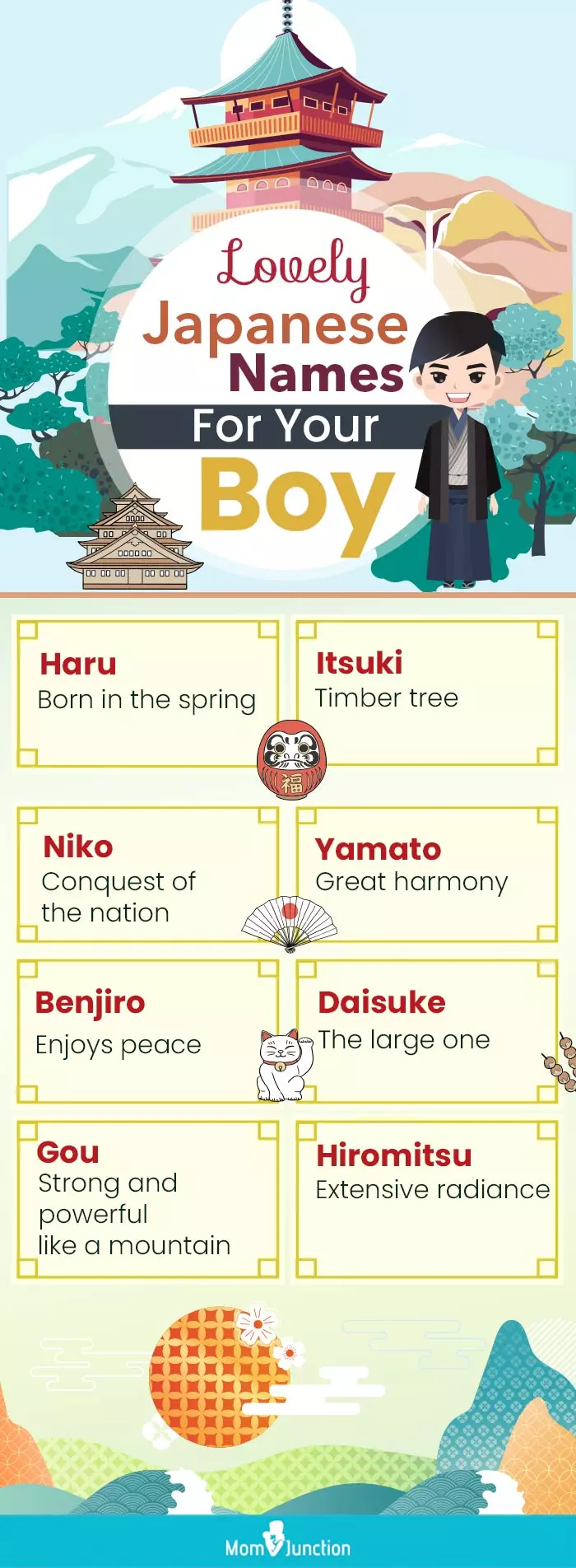
References
- The Japanese Missions to Tang China
7th-9th Centuries - Explore Japan Language
https://web-japan.org/kidsweb/explore/language/index.html - Japanese Religions
https://spice.fsi.stanford.edu/docs/japanese_religions - Buddhism in Ancient Japan
https://www.worldhistory.org/article/1080/buddhism-in-ancient-japan/
Look Up For Many More Names
Do you have a name in mind and want to know more about it? Or want to find names belonging to a particular origin, religion, or having a specific meaning? Use our search tool below to explore more baby names with different combinations.

Community Experiences
Join the conversation and become a part of our nurturing community! Share your stories, experiences, and insights to connect with fellow parents.
Read full bio of Praggya Joshi
Read full bio of Aneesha Amonz
Read full bio of Angela Alex







